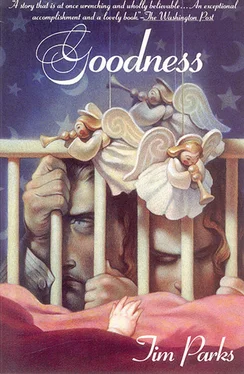Tim Parks - Goodness
Здесь есть возможность читать онлайн «Tim Parks - Goodness» весь текст электронной книги совершенно бесплатно (целиком полную версию без сокращений). В некоторых случаях можно слушать аудио, скачать через торрент в формате fb2 и присутствует краткое содержание. Год выпуска: 1994, Издательство: Grove Press, Жанр: Современная проза, на английском языке. Описание произведения, (предисловие) а так же отзывы посетителей доступны на портале библиотеки ЛибКат.
- Название:Goodness
- Автор:
- Издательство:Grove Press
- Жанр:
- Год:1994
- ISBN:нет данных
- Рейтинг книги:3 / 5. Голосов: 1
-
Избранное:Добавить в избранное
- Отзывы:
-
Ваша оценка:
- 60
- 1
- 2
- 3
- 4
- 5
Goodness: краткое содержание, описание и аннотация
Предлагаем к чтению аннотацию, описание, краткое содержание или предисловие (зависит от того, что написал сам автор книги «Goodness»). Если вы не нашли необходимую информацию о книге — напишите в комментариях, мы постараемся отыскать её.
, to get his life back on the rails again.
Goodness — читать онлайн бесплатно полную книгу (весь текст) целиком
Ниже представлен текст книги, разбитый по страницам. Система сохранения места последней прочитанной страницы, позволяет с удобством читать онлайн бесплатно книгу «Goodness», без необходимости каждый раз заново искать на чём Вы остановились. Поставьте закладку, и сможете в любой момент перейти на страницу, на которой закончили чтение.
Интервал:
Закладка:
Now it’s merely a question of getting Shirley to let me have Hilary for the afternoon. Because I don’t want Shirley to know. Lourdes is one thing, huge, institutional, traditional, respectable. Everybody tries Lourdes. You’d be amazed how many common-or-garden, middle-class protestants have been there with their chronic arthritis, low sperm counts, dyslexic children and miscellaneous cancers. Lourdes is respectable. But a faith-healer off the Fulham Road is something else altogether. The trouble being that the more I try to solve the problem, to save Hilary rather than just leave be, the more bizarre the gestures I make, so the closer Shirley believes I’m getting to doing something drastic.
A certain macabre suspicion has crept into our relationship. She keeps her eye on me.
‘I just thought I’d take her off your back for an afternoon. Give you a chance to relax.’
Shirley is indeed worn out. Who wouldn’t be? It’s been a week of ear infection again. Hilary can’t take regular antibiotics because of the additives they have. She is likewise allergic to the solution most drops come in.
‘Of course if you don’t want me to get close to my daughter. .’
She concedes.
And as I prepare Hilary for the trip I sense again how right I am to insist on finding some kind of solution that will truly be a solution, on not accepting this miserable situation as permanent. For just getting a coat and hat on the girl is a hopeless, wearing, heartbreaking task. Her arms won’t go in the holes. The elbows don’t bend properly. She wriggles and moans, arching her little body fiercely, unnaturally, backwards, eyeballs rolling away so that the iris is almost gone.
I try so hard to be gentle. I force a hand into a sleeve. Then she scratches herself quite badly behind an ear. There’s blood.
Shirley says I haven’t the knack.
I say the girl’s nails shouldn’t be allowed to get so long. Briefly I reflect on the quite endless occasions for discord.
I carry her down the back steps to the garage tossed over my shoulder like a sack of potatoes. She has no muscle-tone. She can’t cling to me like a normal child would. But sensing, from the changes in sound, smell and light, that we must be going out, she begins to gurgle happily. Then cries again as we go through the business of getting her into the car and into some kind of acceptable position on the car seat where I can strap her in. Leaving her crying, I hurry back to the house for nappies, creams, her special two-ton pushchair.
I tell Shirley I’m taking her to hear the band in St James’s Park. It’s a pleasant spring afternoon. Open air and music are two of the few things she is capable of enjoying, aren’t they? Shirley is touched now and embraces me. We would both like not to argue, to be close. ‘George,’ she mutters. ‘Thanks, really.’
In the car when I look in the mirror, my daughter’s head is lolling heavily to one side, a beatific smile on her face which gradually smooths out into sleep. At least I get the fun of the drive.
I suppose I’m expecting somebody thin, drawn, spiritual, mysterious, perhaps dressed in black. I have in mind a medium I saw on some up-market TV drama with dull, glazed, at once unseeing and all-seeing eyes. A make-up job probably. Instead, having humped the sleeping Hilary down a flight of cement steps and negotiated my way past a line of bins and assorted pots with geranium cuttings, I am greeted by a woman who surprises me by her likeness to my mother when she was younger. It is the florid, matronly wholesomeness of the round middle-aged face that strikes me, the clear, kind eyes.
‘You must be Mr Crawley. Do come in. Is this your little daughter?’
Miss Whittaker’s dumpy body is dressed cheaply and sensibly in patterned skirt and synthetic pink sweater. I am disappointed. Far from a mysterious place of healing, her flat might be any of the more middle-class variety one sees when visiting colleagues from work: stuffy, cleanly-kept, unexciting. Photographs of relatives and so on. Though plentiful flowers do give a sense of repose.
‘Mrs Johnson told me about you.’
She wrinkles her forehead and frowns: ‘Mrs Johnson? I’ve got a head like a sieve I’m afraid.’
‘She had a bad back and. .’
‘Oh, yes, right. It’s better now of course.’
‘Yes, it is.’
‘I am glad. And what can I do for you?’
Catching a faint twinkle in her clear eyes I realise that she is aware of, and rather amused by, my sense of disappointment. She is intelligent.
As I begin to mumble my story she walks me through to a small back bedroom where floral curtains and a mass of potted plants are allowing only a dim green light to filter onto spartan furnishings: divan bed, armchair, chair, bookcase. There is none of the religious bric-a-brac I had imagined. Not even the texts my mother invariably hangs on bedroom walls (’They shall rise up on wings as eagles: they shall run and not faint’). Perhaps it’s not going to be the performance I expected.
‘Ah, the girl. No, don’t tell me anything, Mr Crawley. No medical details, please. It only interferes. Just lay her on the bed then, will you.’
Naturally as I try to slip her coat off, for the room is over-heated, Hilary wakes with a heart-stopping howl that freezes thought. Her mouth opens wide, wide, wide. She wails. Under my breath I involuntarily mutter, ‘Bloody hell!’ And immediately, startlingly, I sense that although it is surely impossible with the volume of that howling, Miss Whittaker has somehow heard me. I turn quickly to find her smiling at me with sympathy, but also with a certain sternness. Again I am reminded of my mother.
‘You don’t believe, do you, Mr Crawley?’
‘No, I’m afraid I don’t.’
‘You don’t believe I have any power.’
She talks sweetly without any hint of challenge.
‘Well, I. .’
And all the while I’m trying to stop poor bloody Hilary from rolling off the bed. She is unusually agitated.
‘So may I ask why you came?’
With sudden and I know rude belligerence, I say, ‘Why shouldn’t I come? I’ve got nothing to lose.’
She doesn’t react. On the contrary, there is something irritatingly demure about the way she stands with her fleshy white hands folded in front of her. ‘I think I understand,’ she says. ‘In any event it surely doesn’t help if you curse and swear over your child, does it?’ She raises her eyebrows. We exchange a brief glance, during which I again have the impression that she is coolly aware of what I am thinking: that she is a pious fraud.
‘Do you want me to undress her?’ I ask. The child is crying softly now.
‘No, no, you just relax and sit in the armchair for a little, will you?’
I had been afraid I might be asked to pray or something. She waits for me to move away and then goes to the bed and strokes Hilary’s hair. Immediately the child quietens and begins to gurgle softly.
‘What a pretty little girl,’ Miss Whittaker murmurs. ‘What a pretty pink ribbon Mummy has put in your hair. What pretty clothes. Someone’s mummy and daddy think a lot of them, don’t they? Someone’s a very lucky little girl.’
Curiously, she is right. We do think a lot of her.
I sit in the chair watching the woman’s squat back. Hilary is lying quite still and calm, despite the strange place, the strange voice. This is very unusual. A good sign. So, do I sense the faintest ray of hope? It’s quickly quelled. How can this woman even know what’s wrong with my daughter? There’s nothing to be seen without taking her clothes off. She’s not obviously spastic or mongoloid. The charlatan doesn’t know what I brought her for.
Kneeling on a cushion, Miss Whittaker runs her small podgy hands the length of the child’s body, letting them slide lightly over her clothes. Minutes pass. She has stopped talking now, her hands move back and forth, not hypnotically or even rhythmically, but more with a questing motion, stopping here and there, hovering, moving back, coming quietly to rest: on her head for a full minute, above her knees, her ankles, which below her socks, I know, are fierce with scars. Hilary lies still, eyes blindly open, breathing soft. She doesn’t even move when a plump hand covers her face, gently pressing the eyelids. Leaning over her, Miss Whittaker blows very lightly on her forehead. Then repeats the whole rigmarole.
Читать дальшеИнтервал:
Закладка:
Похожие книги на «Goodness»
Представляем Вашему вниманию похожие книги на «Goodness» списком для выбора. Мы отобрали схожую по названию и смыслу литературу в надежде предоставить читателям больше вариантов отыскать новые, интересные, ещё непрочитанные произведения.
Обсуждение, отзывы о книге «Goodness» и просто собственные мнения читателей. Оставьте ваши комментарии, напишите, что Вы думаете о произведении, его смысле или главных героях. Укажите что конкретно понравилось, а что нет, и почему Вы так считаете.












